In recognition of his pioneering contributions to Chicano poetry and activism, University of Iowa Writers’ Workshop alum Juan Felipe Herrera has been awarded the MacArthur Fellowship.
His is notably the first Latino U.S. Poet Laureate from 2015 to 2017, alongside his Pushcart Prize, Latino Hall of Fame Award, and 30 individual works, including the notable “Akrílika,” which was released in 2022.
Among the three editors and translators of “Akrílika” was his long-time friend Carmen Giménez, an alum of UI’s Creative Writing MFA program and now — director of Graywolf Press.
“‘Akrílika’ went out of print for a decade, and I thought it was necessary to bring it back. It was a very exciting, engaging political voice that was both personal and playful and political,” she said.
Spearheading the efforts to bring the dual-language poetry collection back into print, the reissued translation honored the revolutionary ethos embedded in his work. It now includes archival photographs from the Chicano Movement of the 1970s, artfully connecting the early decades of Herrera’s activism to present-day readership.
“His work is timeless in its subject matter,” she said. “He’s brilliant, he’s quick. The images are dense, they’re pleasurable, and I think of him as a trickster. Often, the trickster knows more than anybody else in the room but is able to just kind of illustrate and mirror back in a really dynamic [way]. Not entertainment, but edification.”
An unusually creative spirit lives inside of the Chicano poet’s voice, which is concerned not only with legibility. The MacArthur Fellowship most certainly addresses the unorthodox syntax and the dual languages dancing side by side in his work.
Herrera finds many of these skills to be correlated with the enrichment he received at the Iowa Writers’ Workshop in 1988 after spending around three decades exploring poetry on his own.
One of the devices he learned and greatly relied on afterward is the idiom. Unique to him, though, is his ability to interweave idiomatic expressions from the Spanish-speaking community with English lines.
“I feel like I learned a lot about what is possible in a sentence and how it can be delivered. His idiom is cultural and is connected to how we envision the world and the country it comes from,” Giménez said.
“Akrílika” and Herrera other works are littered with wordplays. The raw and playful character of these idioms is what allows Herrera to encapsulate Chicano lives and struggles so wholly. He is not at all limited by the rules and literal contours of language, whether it be English or Spanish.
“The first time I read a Latino writer was in college,” Giménez recalled. “Then, you no longer feel separate. These cultural things, language, the way we approach family — to just even see them legible was important.”
Students are now able to experience the impact of Herrera’s accomplishments as well. First-generation college student Linda Pineda said she was raised by her Chicana mother, and this identity has been largely impacted by Latin studies at the UI.
“My mother was born in Mexico and made her way to America. I feel a great sense of pride for my culture,” she said. “And this is encouraged by my professor Jorge Guerra. I have been exposed to plenty of Chicano literature through his class ‘Introduction to Latin/o/x studies,’ with Juan Felipe Herrera being one of few writers that write about our perspectives.”
RELATED: Ask the Authors | Sandra Cisneros, Joy Harjo, Juan Felipe Herrera
Jorge Guerra, a lecturer in Latin/o/x Studies and the Magid Center for Writing at UI lived parallel to Herrera. He, too, was raised in California, finding himself at the Iowa Writers’ Workshop. His courses are dedicated to the evocation of Mexican American life, ranging from the work of Sandra Cisneros to Juan Felipe Herrera.
Through linguistic intervention and a deep entanglement with Chicano culture, Herrera has established himself at the forefront of a legacy that leads thousands of young Chicano poets and artists through self-expression and activism.
“It empowers me, and I’m sure other Latin people as well, to use art and creativity as forms of activism. Our culture is beautiful and colorful, and that can’t be captured with simple documentation,” Pineda added. “They put into words moments from our lives that don’t always feel easy to communicate.”
The grant allows Herrera to invest more into his life’s endeavor of uplifting Mexican-American culture and stories in improvisational, innovative, and vernacular ways.
It is not that Herrera is joining many other elite thinkers and creatives — he has always been one himself, but now, more people and cultures are invited to take part in his legacy.
“He was always this young, revolutionary poet,” Giménez reminisced. “He’s always paired community activism and art. He doesn’t see them being separate entities. That and the generosity of his spirit and multimedia work make him the full package of an artist. I can’t think of anyone that better embodies that identity.”



